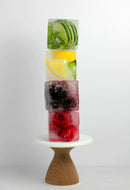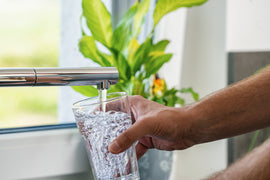Health experts have stood by a recommended eight, 8-oz. glasses of water per day to stay hydrated, which means most people must take their water to go, likely in a reusable bottle or container. However, 60 million plastic water bottles still end up in landfills and incinerators every day. Even though people are drinking more water to stay healthy, it may not be in the most beneficial way possible. The dangers and harmful effects of plastic water bottles include a negative impact on human health as well as a detriment to the environment.
Drinking from disposable a plastic bottle may lead to chemical leaching and toxicity. Chemical leaching occurs when heat causes the toxic chemicals from the plastic to be released into the water. That means leaving water bottles outside in the car or taking them with you to the beach or pool could heat them to a temperature that’s deemed unsafe by many experts in the field due to microplastic contamination. Although there’s been conflicting data about whether bottles left in hot weather conditions for a long time is harmful. There’s a chance the water you’re drinking has traces of lead, chlorine, bacteria, and pesticides, in addition to several other impurities that are toxic to your health.
Additionally, not too long ago, a study from the University of Michigan revealed consumers spend 300 times the cost of tap water to drink bottled water. It named the U.S. the biggest bottled water drinkers on the planet consuming about 61.4 billion gallons a year. While bottled water is still a go-to drink option for many, trends are changing and people want a healthier, more eco-friendly solution. A great way to become more eco-friendly is to use a purified water dispenser.
Simply put, consumers want great tasting water free of impurities that don’t result in plastic waste. Fortunately, FloWater is an innovative answer that addresses these needs.
Effects of Plastic Water Bottles on Health
In 2012, the FDA banned bisphenol-A or BPA from infant formula packaging. Bottled water companies soon followed suit to eliminate BPA in their products. Despite the ban and decrease in use, there’s still a high risk of chemicals found in plastic water bottles. People who want to reach their eight-glasses-of-water-a-day goal may be surprised by their healthy habit may actually make them ill depending on their water source.
After evaluating 18 bottled water products, one study found nearly 25,000 chemicals in bottled water. Among these were endocrine disrupting chemicals (EDCs), like BPA, which adversely affect human health. Furthermore, the FDA has started regulating bottled water for E. coli, and studies have revealed bottle water samples also containing mold, benzene, microbes, and in some cases, arsenic.
- Symptoms of E. coli exposure include gastrointestinal problems, vomiting, diarrhea, as well as headaches and fatigue.
- Mold causes several health problems including coughing, throat and eye irritation, and allergic reactions that may affect the respiratory system, induce asthma and lead to other immune-related conditions.
- Benzene is categorized as a human carcinogen and carries a long-term effect on the blood. It can eventually cause a decrease in red blood cells, negatively affect the immune system, and at high levels, can cause vomiting, dizziness, and rapid heart rate.
The effects of plastic containers on health are a result of exposure to any mix of toxins and chemicals, and include a range of symptoms and conditions. Even trace amounts could impact the body and worsen over time. In addition to the toxic chemicals found in plastic water bottles, a quarter of tap water is not safe to drink as it fails to meet EPA standards. It is crucial to understand the different indicators of water quality to make sure your water is safe for you and your loved ones drinking it.
A recent study done by the State University of New York in Fredonia shows that there are excessive levels of microplastics in bottled water, especially in popular brands. Microplastics are small plastic debris pieces measuring 5 millimeters or smaller. Microplastic is found in over 93% of bottled water and while The World Health Organization says that there is no evidence consumption of microplastics affect your health, it is still an area of concern.
FloWater offers the same tap water minerals (calcium, magnesium, potassium) that are good for the body and also adds iron, sodium, and manganese, all while delivering less than one percent of contaminants. FloWater also meets all 20 indicators of physical health and mental wellness in the water category. Among these are:
- The desire to drink water
- Healthy organs
- Good hydration levels
- Alertness
- Sustained levels of energy
- Healthy skin
It is the top choice when compared to a water cooler and bottled water. Other benefits are a reduction in plastic waste and no negative effect on animals. When you have tap water that has been filtered to remove up to 99% of impurities, you can feel good about what you’re consuming. Not only does FloWater eliminate the chance for chemicals in plastic water bottles, it tastes better, too.
The Environmental Impact Of Plastic Waste and Discarded Water Bottles
Not only are single use plastic and plastic drinking bottles harmful for you, but they also play a large role in plastic pollution and other environmental issues. There are plenty of health risks that drinking from plastic water bottles entails, and it’s not ideal for the environment either. The majority of the time, adisposable plastic water bottle ends up in landfills where it takes up to 1,000 years to break them down, if not more. One consumer report reveals U.S. residents buy over a half a billion plastic water bottles weekly. That’s nearly 25 billion plastic water bottles used annually with only 12% of them recycled. We can do a lot better as a community by learning how to reduce pollution.
To break down this energy strain on the environment, the Pacific Institute defines it as approximately 100 billion MJ of energy (for every one million ton of polyethylene terephthalate used for plastic water bottles), which translates to roughly 17 million barrels of oil. That’s enough to fuel a million American cars for a year.
It’s also been estimated that by 2050, the ocean will hold more plastic in weight than fish. Plastic waste is harmful to animals and disrupts ecosystems due to the chemicals that are leaked and infiltrate the air. It’s apparent that whether by land, sea, or air, the dangers of plastic water bottles are a concern for environmentalists and consumers alike.
Cities and businesses are making it more of a priority to focus on solutions to help protect communities from urban water pollution. Fortunately, there are more energy efficient, environmentally-friendly ways, such as FloWater, to get quality water in a way that’s sustainable.
Hydration Alternatives to Plastic Water Bottles
There are several options people can use to get their daily hydration and avoid the risks associated with plastic water bottles. One way is to drink straight from the tap, which depending on your location, may carry its own risks due to contamination. The Environmental Protection Agency (EPA) sets health standards to protect the nation’s public drinking water supply. However, not all tap water is created equal. It depends on the original source, the city’s infrastructure, and other regulations each water region may apply separately from the set EPA guidelines. It’s important to be aware of the dangers of tap water, especially when you consider that a quarter of tap water does not meet the EPA standards.
Adding a filter to tap water is a good way to use what’s available at the source in a way that’s healthy for human consumption. Pitcher water filters, faucet water filters, refillable gallon jugs, and water delivery systems are all alternatives to using plastic water bottles. However, this water filtration may not eliminate all of the contaminants from tap water supply and may prove to be more costly and less convenient in the long run.
Reusable water bottles are also increasingly popular because of the growing number of products available. There are several options that keep water cold throughout the day and are easy to care for and carry around. They’re also refillable, which makes them good for travel as many hotels and airports have now set up filtered water systems for guest use. These refilling stations still provide the same kind of quality water you may be used to at home and allow you to stay hydrated on-the-go.
With FloWater, it makes economic, environmental, and health sense for businesses to use its specialized Refill Stations to supply water to employees, guests, and staff. These stations have been built with consumers in mind. They fit all container sizes and provide water free of impurities with added minerals and electrolytes. Plus, there’s a one-touch fill that makes it easy to use and sanitary to fill. There’s no waste and minimal maintenance making it an ideal way for companies to set up a greener water alternative to offering plastic water bottles on site.
The solution for better hydration is simple: rather than buying bottled water, which is costly to the budget not to mention harmful to the environment, why not just make improvements to the water from your own tap?
Advanced Purification Solution For Better Water
Despite the various filters and alternatives to plastic water bottles that are available, FloWater uses an innovative 7x Advanced Water Purification process that removes impurities typically found in city water. The result is clean, crisp-tasting water that keeps traces of essential minerals and electrolytes like those found in sports drinks and coconut water.
In blind taste tests, consumers prefer FloWater over tap water 9 times out of 10 and choose FloWater over premium bottled water 8 times out of 10. In fact, customer research has shown 54% of customers have stopped using bottled water altogether. Here’s how the filtration works:
- First, it starts with sediment purification that removes dirt, dust, rust, and other impurities that exist in your tap water or the pipes it flows through.
- Next, water passes through a carbon filter to remove smaller particles, such as radon and chlorine, that often leaves unpleasant tastes or odors.
- Following the sediment and carbon filters, there is an advanced osmosis filter that removes anything remaining that can contaminate the water. This includes lead, pesticides, bacteria, and other dissolved solids and metals. This is currently five times more efficient than anything else available on the market today.
- In the fourth step, there’s another level of filtration. Then, small amounts of activated oxygen are added to the water. This sanitizes the tanks and internal system and increases the oxygen level in the water to improve the taste.
- Fifth, there is an alkaline filter that adds a proprietary blend of ten trace minerals to the water, which raises the pH level of the tap water. A higher pH helps to neutralize acidity in the body and can relieve some of the stress on internal organs.
- After the five phases of filtration, electrolytes (magnesium, potassium, sodium, calcium) added to help with cell repair, bone strength, hydration, and increased energy.
- Finally, the coconut carbon filter is uniquely made of coconut husks to result in a crisp and clean taste. Coconut husks capture and absorb tiny contaminant particles and remove lingering odors and unpleasant tastes.
This unique, thorough water purification method process ensures a filtered drinking water experience every time for people who are mindful of their water intake but want to avoid the dangers of plastic water bottles to reach their daily hydration goals.
Reap The Benefits of Bottleless Water
After reviewing the dangerous effects of plastic water bottles on your health, the environmental burdens, and plastic water bottle alternatives, it’s clear there is a benefit from avoiding single-use water bottles altogether. With FloWater, you can drink water that’s highly purified and more energy efficient without plastic waste. Plus, it’s more cost-effective and easily accessible for all.
Additionally, when you have 99% pure water, there’s no need for extra flavoring or drink alternatives to get adequate hydration during the day. Many bottled water brands add sugars or other additives to cover the taste of the water. This only deters healthy habits when trying to stay hydrated. Customer research shows FloWater users drink 76% more water and saw a 54% reduction in the consumption of other sugary beverages.
Businesses, schools, hotels, and fitness studios have all embraced the availability of FloWater’s innovative purified water systems. They are self-sanitizing and hold up to seven gallons of purified water at all times. It’s a perk for businesses that want to fulfill employees’ need for healthier, more sustainable options. It also is a great amenity for hotels to offer guests who can use the Refill Station throughout the duration of their stay. Likewise, it makes sense for gyms and outdoor events to have these filtered water stations available for members and attendees to provide a source of natural electrolytes and minerals to help boost oxygen levels, increase rehydration speed, and maximize performance.
Think about the quality of water you’re drinking based on where it’s sourced from. There are lasting impacts of drinking from plastic water bottles that pose dangers to your health and the environment. Through innovation and technology, FloWater provides a sustainable water filtration option that results in clean, crisp water available wherever you are. Reap the benefits that only water purified seven times can offer.
Sources:
- http://www.container-recycling.org/index.php/issues/.../275-down-the-drain;
- https://uspirg.org/blogs/blog/usp/fda%E2%80%99s-bpa-ban-small-late-step-right-direction;
- https://www.mindbodygreen.com/0-11193/7-reasons-to-never-drink-bottled-water-again.html
- https://www.businessinsider.com/bottled-water-costs-2000x-more-than-tap-2013-7;
- https://journals.plos.org/plosone/article?id=10.1371/journal.pone.0072472#abstract0;
- https://printabletemplates.com/facts-about-mold-and-dampness/
- https://www.today.com/health/bottled-water-hot-plastic-may-leach-chemicals-some-experts-say-t132687;
- https://storyofstuff.org/movies/story-of-bottled-water/;
- https://www.forbes.com/sites/trevornace/2017/07/26/million-plastic-bottles-minute-91-not-recycled/#7bcf64cc292c







